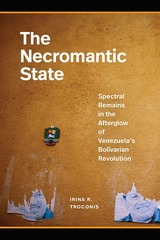24 start with S start with S

In A Scientist's Guide to Talking with the Media, Richard Hayes and Daniel Grossman draw on their expertise in public relations and journalism to empower researchers in a variety of fields to spread their message on their own terms. The authors provide tips on how to translate abstract concepts into concrete metaphors, craft soundbites, and prepare for interviews. For those looking for a higher profile, the authors explain how to become a reporter's trusted source-the first card in the Rolodex-on controversial issues.
A must-read for all scientists, this book shows how it is possible for the discoveries that hibernate in lecture halls and academic journals to reach a broader audience in a way that is accurate and effective.
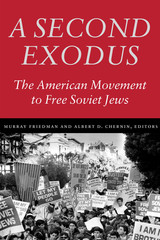
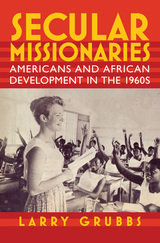

Among the most momentous decisions that leaders of a state are called upon to make is whether or not to initiate warfare. How their military will fare against the opponent may be the first consideration, but not far behind are concerns about domestic political response and the reaction of the international community.
Securing Approval makes clear the relationship between these two seemingly distinct concerns, demonstrating how multilateral security organizations like the UN influence foreign policy through public opinion without ever exercising direct enforcement power. While UN approval of a proposed action often bolsters public support, its refusal of endorsement may conversely send a strong signal to domestic audiences that the action will be exceedingly costly or overly aggressive. With a cogent theoretical and empirical argument, Terrence L. Chapman provides new evidence for how multilateral organizations matter in security affairs as well as a new way of thinking about the design and function of these institutions.

In Seeing Stars, Dennis J. Frost traces the emergence and evolution of sports celebrity in Japan from the seventeenth through the twenty-first centuries. Frost explores how various constituencies have repeatedly molded and deployed representations of individual athletes, revealing that sports stars are socially constructed phenomena, the products of both particular historical moments and broader discourses of celebrity.
Drawing from media coverage, biographies, literary works, athletes’ memoirs, bureaucratic memoranda, interviews, and films, Frost argues that the largely unquestioned mass of information about sports stars not only reflects, but also shapes society and body culture. He examines the lives and times of star athletes—including sumo grand champion Hitachiyama, female Olympic medalist Hitomi Kinue, legendary pitcher Sawamura Eiji, and world champion boxer Gushiken Yokoō—demonstrating how representations of such sports stars mediated Japan’s emergence into the putatively universal realm of sports, unsettled orthodox notions of gender, facilitated wartime mobilization of physically fit men and women, and masked lingering inequalities in postwar Japanese society.
As the first critical examination of the history of sports celebrity outside a Euro-American context, this book also sheds new light on the transnational forces at play in the production and impact of celebrity images and dispels misconceptions that sports stars in the non-West are mere imitations of their Western counterparts.

The post-World War II years in the United States were marked by the business community's efforts to discredit New Deal liberalism and undermine the power and legitimacy of organized labor. In Selling Free Enterprise, Elizabeth Fones-Wolf describes how conservative business leaders strove to reorient workers away from their loyalties to organized labor and government, teaching that prosperity could be achieved through reliance on individual initiative, increased productivity, and the protection of personal liberty.
Based on research in a wide variety of business and labor sources, this detailed account shows how business permeated every aspect of American life, including factories, schools, churches, and community institutions.
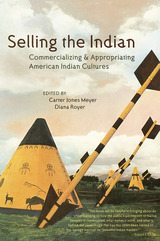
For more than a hundred years, outsiders enamored of the perceived strengths of American Indian cultures have appropriated and distorted elements of them for their own purposes—more often than not ignoring the impact of the process on the Indians themselves. This book contains eight original contributions that consider the selling of American Indian culture and how it affects the Native community. It goes beyond studies of “white shamanism” to focus on commercial ventures, challenging readers to reconsider how Indian cultures have been commercialized in the twentieth century.
Some selections examine how Indians have been displayed to the public, beginning with a “living exhibit” of Cocopa Indians at the 1904 Louisiana Purchase Exposition and extending to contemporary stagings of Indian culture for tourists at Tillicum Village near Seattle. Other chapters range from the Cherokees to Puebloan peoples to Indians of Chiapas, Mexico, in an examination of the roles of both Indians and non-Indian reformers in marketing Native arts and crafts.
These articles show that the commercialization and appropriation of American Indian cultures have been persistent practices of American society over the last century and constitute a form of cultural imperialism that could contribute to the destruction of American Indian culture and identity. They offer a means toward understanding this complex process and provide a new window on Indian-white interactions.
CONTENTS
Part I: Staging the Indian
1. The “Shy” Cocopa Go to the Fair, Nancy J. Parezo and John W. Troutman
2. Command Performances: Staging Native Americans at Tillicum Village, Katie N. Johnson and Tamara Underiner
3. Savage Desires: The Gendered Construction of the American Indian in Popular Media, S. Elizabeth Bird
4. “Beyond Feathers and Beads”: Interlocking Narratives in the Music and Dance of Tokeya Inajin (Kevin Locke), Pauline Tuttle
Part II: Marketing the Indian
5. “The Idea of Help”: White Women Reformers and the Commercialization of Native American Women’s Arts, Erik Trump
6. Saving the Pueblos: Commercialism and Indian Reform in the 1920s, Carter Jones Meyer
7. Marketing Traditions: Cherokee Basketry and Tourist Economies, Sarah H. Hill
8. Crafts, Tourism, and Traditional Life in Chiapas, Mexico: A Tale Related by a Pillowcase, Chris Goertzen
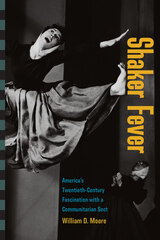
This interdisciplinary study places the activities of individuals—including Doris Humphrey, Charles Sheeler, Laura Bragg, Juliana Force, and Edward Deming Andrews—within the larger cultural and historical contexts of nationalism, modernism, and cultural resource management. Taking up previously unexamined primary sources and cultural productions that include the first scholarly studies of the faith, material culture and visual arts, stage performances, and museum exhibitions, Shaker Fever compels a reconsideration of this religious group and its place within American memory. It is sure to delight enthusiasts, public historians, museum professionals, furniture collectors, and anyone interested in the dynamics of cultural appropriation and stewardship.
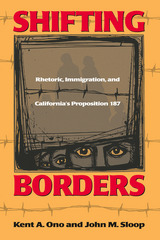
"Like articles representing the positions of proponents of the measure, those representing opponents constructing the nation as potentially in danger as a result of undocumented immigration."
How do we learn to recognize the damning effects of good rhetorical intentions? And where will we find arguments which escape this trap that permeates the liberal social policy world? Shifting Borders uses an evaluation of the debate over California Proposition 187 to demonstrate how this quandary is best understood by close interrogation of mainstream reports and debates and by bringing to the fore voices that are often left out of mediated discussions.
It is these voices outside the mainstream, so-called "outlaw" discourses, that hold the best possibilities for real social change. To illustrate their claim, the authors present dominant and outlaw discourses around Proposition 187, from television reports, internet chat sites, and religious discourse to coverage of the Los Angeles Times. Their critique ably demonstrates how difficult it is to maintain a position outside the mainstream, but also how important it is for the press, citizens and scholars to actively search out such voices. The findings are organized through a model that provides an innovative method for understanding events and arguments through their rhetorical and communicative construction. In a world where the mediated word defines so much of what we know, Shifting Borders provides a lucid introduction to analyzing the spoken and written word that constitutes political debate in contemporary U.S. culture. In doing so, it makes an important contribution to any future development of progressive political strategy.
postamble();
Shrines to Living Men in the Ming Political Cosmos, the first book focusing on premortem shrines in any era of Chinese history, places the institution at the intersection of politics and religion. When a local official left his post, grateful subjects housed an image of him in a temple, requiting his grace: that was the ideal model. By Ming times, the “living shrine” was legal, old, and justified by readings of the classics.
Sarah Schneewind argues that the institution could invite and pressure officials to serve local interests; the policies that had earned a man commemoration were carved into stone beside the shrine. Since everyone recognized that elite men might honor living officials just to further their own careers, premortem shrine rhetoric stressed the role of commoners, who embraced the opportunity by initiating many living shrines. This legitimate, institutionalized political voice for commoners expands a scholarly understanding of “public opinion” in late imperial China, aligning it with the efficacy of deities to create a nascent political conception Schneewind calls the “minor Mandate of Heaven.” Her exploration of premortem shrine theory and practice illuminates Ming thought and politics, including the Donglin Party’s battle with eunuch dictator Wei Zhongxian and Gu Yanwu’s theories.

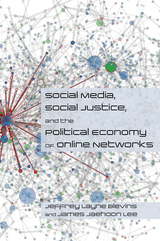
Next Generation e-book nonfiction 2023 Indie Book Award Prize.
While social network analyses often demonstrate the usefulness of social media networks to affective publics and otherwise marginalized social justice groups, this book explores the domination and manipulation of social networks by more powerful political groups. Jeffrey Layne Blevins and James Lee look at the ways in which social media conversations about race turn politically charged, and in many cases, ugly. Studies show that social media is an important venue for news and political information, while focusing national attention on racially involved issues. Perhaps less understood, however, is the effective quality of this discourse, and its connection to popular politics, especially when Twitter trolls and social media mobs go on the attack.
Taking on prominent case studies from the past few years, including the Ferguson protests and the Black Lives Matter movement, the 2016 presidential election, and the rise of fake news, this volume presents data visualization sets alongside careful scholarly analysis. The resulting volume provides new insight into social media, legacy news, and social justice.
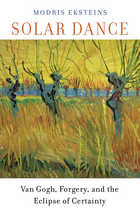
In Modris Eksteins’s hands, the interlocking stories of Vincent van Gogh and art dealer Otto Wacker reveal the origins of the fundamental uncertainty that is the hallmark of the modern era. Through the lens of Wacker’s sensational 1932 trial in Berlin for selling fake Van Goghs, Eksteins offers a unique narrative of Weimar Germany, the rise of Hitler, and the replacement of nineteenth-century certitude with twentieth-century doubt.
Berlin after the Great War was a magnet for art and transgression. Among those it attracted was Otto Wacker, a young gay dancer turned art impresario. His sale of thirty-three forged Van Goghs and the ensuing scandal gave Van Gogh’s work unprecedented commercial value. It also called into question a world of defined values and standards that had already begun to erode during the war. Van Gogh emerged posthumously as a hero who rejected organized religion and other suspect sources of authority in favor of art. Self-pitying Germans saw in his biography a series of triumphs—over defeat, poverty, and meaninglessness—that spoke to them directly. Eksteins shows how the collapsing Weimar Republic that made Van Gogh famous and gave Wacker an opportunity for reinvention propelled a third misfit into the spotlight. Taking advantage of the void left by a gutted belief system, Hitler gained power by fashioning myths of mastery.
Filled with characters who delight and frighten, Solar Dance merges cultural and political history to show how upheavals of the early twentieth century gave rise to a search for authenticity and purpose.
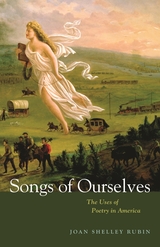
Listen to a short interview with Joan Shelley RubinHost: Chris Gondek | Producer: Heron & Crane
In the years between 1880 and 1950, Americans recited poetry at family gatherings, school assemblies, church services, camp outings, and civic affairs. As they did so, they invested poems--and the figure of the poet--with the beliefs, values, and emotions that they experienced in those settings.
Reciting a poem together with others joined the individual to the community in a special and memorable way. In a strikingly original and rich portrait of the uses of verse in America, Joan Shelley Rubin shows how the sites and practices of reciting poetry influenced readers' lives and helped them to find meaning in a poet's words.
Emphasizing the cultural circumstances that influenced the production and reception of poets and poetry in this country, Rubin recovers the experiences of ordinary people reading poems in public places. We see the recent immigrant seeking acceptance, the schoolchild eager to be integrated into the class, the mourner sharing grief at a funeral, the grandparent trying to bridge the generation gap--all instances of readers remaking texts to meet social and personal needs. Preserving the moral, romantic, and sentimental legacies of the nineteenth century, the act of reading poems offered cultural continuity, spiritual comfort, and pleasure.
Songs of Ourselves is a unique history of literary texts as lived experience. By blurring the boundaries between "high" and "popular" poetry as well as between modern and traditional, it creates a fuller, more democratic way of studying our poetic language and ourselves.

Setting the tone for the collection, NASA chief historian Roger D. Launius and Howard McCurdy maintain that the nation's presidency had become imperial by the mid-1970s and that supporters of the space program had grown to find relief in such a presidency, which they believed could help them obtain greater political support and funding. Subsequent chapters explore the roles and political leadership, vis-à-vis government policy, of presidents Eisenhower, Kennedy, Johnson, Nixon, Ford, Carter, and Reagan.

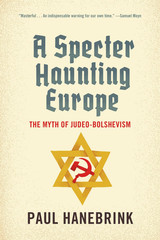
“Masterful…An indispensable warning for our own time.”
—Samuel Moyn
“Magisterial…Covers this dark history with insight and skill…A major intervention into our understanding of 20th-century Europe and the lessons we ought to take away from its history.”
—The Nation
For much of the last century, Europe was haunted by a threat of its own imagining: Judeo-Bolshevism. The belief that Communism was a Jewish plot to destroy the nations of Europe took hold during the Russian Revolution and quickly spread. During World War II, fears of a Judeo-Bolshevik conspiracy were fanned by the fascists and sparked a genocide. But the myth did not die with the end of Nazi Germany. A Specter Haunting Europe shows that this paranoid fantasy persists today in the toxic politics of revitalized right-wing nationalism.
“It is both salutary and depressing to be reminded of how enduring the trope of an exploitative global Jewish conspiracy against pure, humble, and selfless nationalists really is…A century after the end of the first world war, we have, it seems, learned very little.”
—Mark Mazower, Financial Times
“From the start, the fantasy held that an alien element—the Jews—aimed to subvert the cultural values and national identities of Western societies…The writers, politicians, and shills whose poisonous ideas he exhumes have many contemporary admirers.”
—Robert Legvold, Foreign Affairs
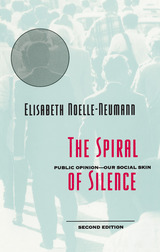
For this second edition, Noelle-Neumann has added three new chapters: the first discusses new discoveries in the history of public opinion; the second continues the author's efforts to construct a comprehensive theory of public opinion, addressing criticisms and defenses of her "spiral of silence" theory that have appeared since 1980; the third offers a concise and updated summary of the book's arguments.

Hopkins finds that although personal experience with the ACA’s Medicaid expansion increased favorability among low-income Americans, it did not have a broader overall impact on public opinion. Personal experience with the Health Insurance Marketplace did not increase wider support for the ACA either. Due to the complex nature of the law, users of the Marketplace often did not realize they were benefiting from the ACA. Therefore, perceptions of the Marketplace were shaped by high-profile issues with the enrollment website and opposition to the individual mandate. These experiences ultimately offset one another, resulting in little discernable change in public opinion overall. Hopkins argues that political polarization was also responsible for elite’s limited influence and that public opinion on the ACA was largely determined by partisanship and political affiliation. Americans quickly aligned with their party’s stance on the law and were resistant to changing their beliefs despite the efforts of political elites.
Stable Condition is an illuminating examination of the limits of elites’ influence and the forces that shaped public opinion about the Affordable Care Act.

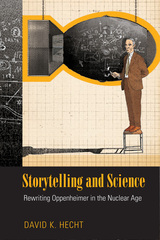
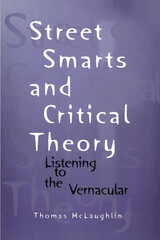
Everybody’s got a theory . . . or do they?
Thomas McLaughlin argues that critical theory—raising serious, sustained questions about cultural practice and ideology—is practiced not only by an academic elite but also by savvy viewers of sitcoms and TV news, by Elvis fans and Trekkies, by labor organizers and school teachers, by the average person in the street.
Like academic theorists, who are trained in a tradition of philosophical and political skepticism that challenges all orthodoxies, the vernacular theorists McLaughlin identifies display a lively and healthy alertness to contradiction and propaganda. They are not passive victims of ideology but active questioners of the belief systems that have power over their lives. Their theoretical work arises from the circumstances they confront on the job, in the family, in popular culture. And their questioning of established institutions, McLaughlin contends, is essential and healthy, for it energizes other theorists who clarify the purpose and strategies of institutions and justify the existence of cultural practices.
Street Smarts and Critical Theory leads us through eye-opening explorations of social activism in the Southern Christian anti-pornography movement, fan critiques in the ‘zine scene, New Age narratives of healing and transformation, the methodical manipulations of the advertising profession, and vernacular theory in the whole-language movement. Emphasizing that theory is itself a pervasive cultural practice, McLaughlin calls on academic institutions to recognize and develop the theoretical strategies that students bring into the classroom.
“This book demystifies the idea of theory, taking it out of the hands of a priestly caste and showing it as the democratic endowment of the people.”—Daniel T. O’Hara, Temple University, author of Radical Parody: American Culture and Critical Agency after Foucault and Lionel Trilling: The Work of Liberation.
“McLaughlin takes seriously the critical and theoretical activity of everyday people and does so in a way that will empower these very populations to take seriously their own activities as theorists. . . . A manifesto that is sure to be heard by the younger generation of thinkers in American cultural studies.”—Henry Jenkins, MIT, author of Textual Poachers: Television Fans and Participatory Culture
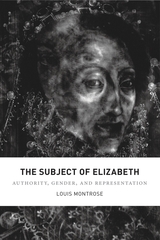
Montrose offers a masterful account of the texts, pictures, and performances in which the Queen was represented to her people, to her court, to foreign powers, and to Elizabeth herself. Retrieving this “Elizabethan imaginary” in all its richness and fascination, Montrose presents a sweeping new account of Elizabethan political culture. Along the way, he explores the representation of Elizabeth within the traditions of Tudor dynastic portraiture; explains the symbolic manipulation of Elizabeth’s body by both supporters and enemies of her regime; and considers how Elizabeth’s advancing age provided new occasions for misogynistic subversions of her royal charisma.
This book, the remarkable product of two decades of study by one of our most respected Renaissance scholars, will be welcomed by all historians, literary scholars, and art historians of the period.
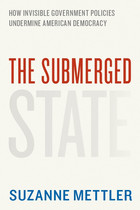
“Keep your government hands off my Medicare!” Such comments spotlight a central question animating Suzanne Mettler’s provocative and timely book: why are many Americans unaware of government social benefits and so hostile to them in principle, even though they receive them? The Obama administration has been roundly criticized for its inability to convey how much it has accomplished for ordinary citizens. Mettler argues that this difficulty is not merely a failure of communication; rather it is endemic to the formidable presence of the “submerged state.”
In recent decades, federal policymakers have increasingly shunned the outright disbursing of benefits to individuals and families and favored instead less visible and more indirect incentives and subsidies, from tax breaks to payments for services to private companies. These submerged policies, Mettler shows, obscure the role of government and exaggerate that of the market. As a result, citizens are unaware not only of the benefits they receive, but of the massive advantages given to powerful interests, such as insurance companies and the financial industry. Neither do they realize that the policies of the submerged state shower their largest benefits on the most affluent Americans, exacerbating inequality. Mettler analyzes three Obama reforms—student aid, tax relief, and health care—to reveal the submerged state and its consequences, demonstrating how structurally difficult it is to enact policy reforms and even to obtain public recognition for achieving them. She concludes with recommendations for reform to help make hidden policies more visible and governance more comprehensible to all Americans.
The sad truth is that many American citizens do not know how major social programs work—or even whether they benefit from them. Suzanne Mettler’s important new book will bring government policies back to the surface and encourage citizens to reclaim their voice in the political process.
READERS
Browse our collection.
PUBLISHERS
See BiblioVault's publisher services.
STUDENT SERVICES
Files for college accessibility offices.
UChicago Accessibility Resources
home | accessibility | search | about | contact us
BiblioVault ® 2001 - 2025
The University of Chicago Press


